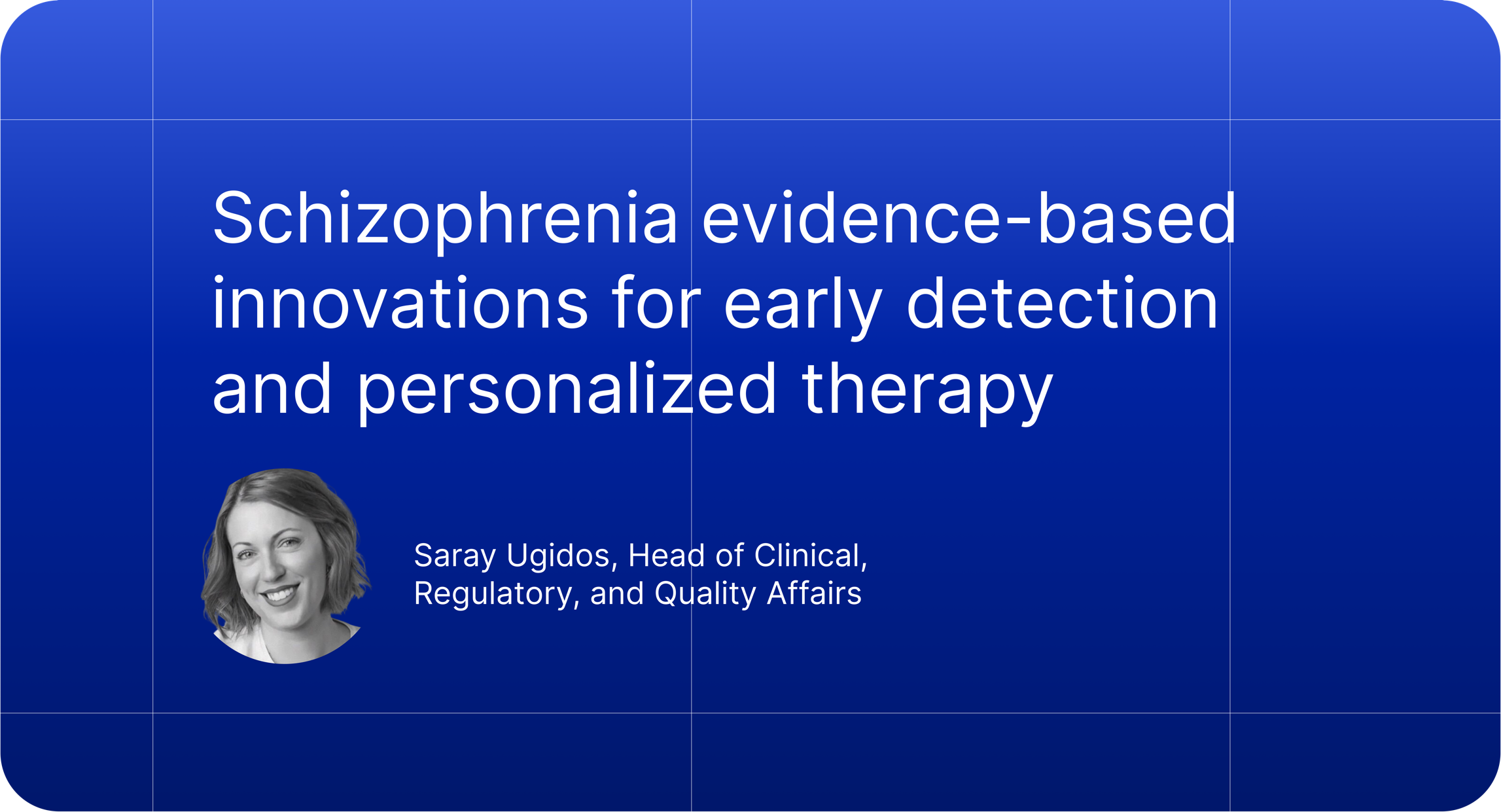Schizophrenia is a chronic and often debilitating mental health condition impacting over 20 million people worldwide. Despite decades of pharmacological research, existing therapies continue to fall short, particularly in addressing negative symptoms such as social withdrawal, diminished motivation, and cognitive impairment. However, a new era of care is opening through digital health.
At the intersection of artificial intelligence (AI), mobile technology, and patient-centered design, digital solutions are not only improving symptom monitoring and intervention timing but also helping redefine how recovery and relapse are understood.
Aura Health remains closely engaged with this transformation as digital health evolves from promising innovation to real-world impact.
Real-time symptom monitoring and phenotyping
A major trend in mental health care is the emergence of digital phenotyping, a method of collecting behavioral data using personal devices like smartphones and wearables to gain insight into emotional states, cognitive functioning, and daily activity patterns.
The Accelerating Medicines Partnership® Schizophrenia Program (AMP SCZ), launched through a collaboration between the U.S. National Institutes of Health and multiple academic partners, is now tracking individuals at clinical high risk for psychosis across two years. Participants share daily subjective reports and biometric data, including sleep cycles, movement, and screen interaction. The aim is to create predictive models capable of forecasting the onset of psychotic symptoms.
Initial results from this longitudinal research show that passive data collection can capture subtle behavioral shifts, changes in speech cadence, mobility patterns, or digital engagement, days or even weeks before a clinical crisis. These findings are increasingly being translated into clinical decision support systems designed for real-time use.
Aura Health’s work with clinical research teams reflects a shared vision: That continuous, non-invasive data collection can move care beyond reactive models and provide earlier, individualized interventions for patients showing early signs of deterioration.
For real-world implementation to succeed, digital systems must be designed not just for prediction, but also for engagement, accessibility, and privacy, a point repeatedly emphasized in Aura’s clinical insight pieces.
Prescription Digital Therapeutics for treatment-resistant symptoms
One of the most exciting developments in digital mental health is the emergence of prescription digital therapeutics (DTx). These are clinically validated, software-based interventions that complement traditional medications. While digital solutions are often associated with behavioral coaching or telehealth platforms, DTx are regulated as medical devices, with evidence to support their efficacy.
Clinical trials involving CT-155, a digital therapeutic designed to target amotivation and other negative symptoms, have shown promising results. A recent randomized controlled trial demonstrated that CT-155 participants experienced significantly higher improvements in motivation and goal-directed behaviour than those receiving standard care alone (Psychiatric Times, 2024).
Beyond symptom relief, DTx presents another critical opportunity: to collect high-frequency data on user interaction and response. As Aura Health and its partners know well, this type of data not only informs better product design but also contributes to refined clinical protocols and reimbursement pathways.
Artificial intelligence and predictive analytics in Schizophrenia care
With the increasing availability of real-world data from digital tools, AI is now being integrated into schizophrenia care to assist with diagnostic support, treatment personalization, and relapse prevention.
A study published in PLOS Digital Health, 2025 trained over 120 machine learning models on passive and active data from smartphone interactions. These models successfully predicted shifts in mental state, including mood fluctuations and early relapse indicators, with an average predictive accuracy of 80% (PLOS Digital Health, 2025).
Importantly, this isn’t just theoretical. Personalized care pathways based on AI analysis are already being prototyped within advanced care models across Europe. Aura Health’s involvement in interdisciplinary research demonstrates how predictive tools can be ethically and securely integrated into medical devices throughout their development lifecycle.
As described in our article on the lifecycle of healthcare AI, algorithm transparency and clinical validation are critical. AI in schizophrenia must not only be accurate but also explainable, making its recommendations understandable and actionable by clinicians.
The Digital Therapeutic Alliance and patient engagement
Another breakthrough in recent research: the concept of a “digital therapeutic alliance”, essentially, the degree of trust and engagement a patient builds with a therapeutic app or platform.
A 2025 study in JMIR Mental Health evaluating CT-155 discovered that users who reported a stronger sense of connection and therapeutic interaction with the app had significantly higher adherence rates and better treatment outcomes than those who didn’t. This suggests that even in digital interventions, relational factors matter (JMIR Mental Health, 2025).
These findings reinforce the importance of human-centered and emotionally supportive design principles embedded early in the development of digital tools. Aura Health’s design-first strategies support usability and accessibility as much as clinical efficacy, ensuring the intervention meets the cognitive and psychological needs of its users.
Real-world barriers to implementation
Despite technological advances, the real-world implementation of digital tools for schizophrenia care faces several persistent barriers:
- Exclusion criteria in clinical trials often disqualify patients with comorbidities or low digital literacy. Recent meta-analyses show up to 73% of real-world schizophrenia patients would be ineligible for most digital health trials (Nature Mental Health, 2025).
- Reimbursement and regulatory pathways for digital therapeutics are still emerging across Europe and the US.
- Privacy and data ownership continue to limit adoption, especially when working with vulnerable populations.
Addressing these challenges requires not just industry innovation but also strategic policy planning. As ongoing in European programs like the EU-funded “Rethinking Schizophrenia Care Pathway” initiative, stakeholders are pushing for standardization, access equity, and funding infrastructure to support digital mental health integration.
Summary of research insights
| Research Focus | Key Findings | Source |
|---|---|---|
| Digital phenotyping | Predicted psychosis onset up to 14 days in advance using mobile data | Nature Digital Medicine, 2025 |
| CT-155 prescription therapeutic | 30% improvement in motivation vs. standard care | Psychiatric Times, 2024 |
| AI-based relapse prediction | Reached 80% accuracy using passive behavioral data | PLOS Digital Health, 2025 |
| Digital therapeutic alliance | Strong digital engagement improved outcomes and reduced dropouts | JMIR Mental Health, 2025 |
| Trial population mismatch | 73% of real-world patients excluded from most trials | Nature Mental Health, 2025 |
Conclusion
In 2025, the convergence of clinical neuroscience, digital health, and artificial intelligence is offering a hopeful new vision for schizophrenia care. Advances in digital phenotyping, predictive analytics, and therapeutic software are not just improving individual outcomes; they’re shifting how entire systems conceptualize and deliver psychiatric care.
Aura Health continues to operate at the intersection of this transformation, connecting research, regulation, and real-world implementation through meaningful, evidence-driven partnerships.
To explore more insights into how these technologies are evolving from research to reality, visit the Aura Health news and insights page.

